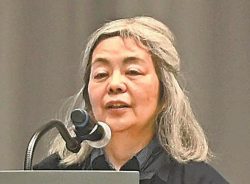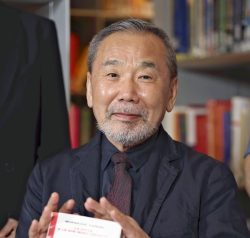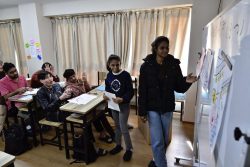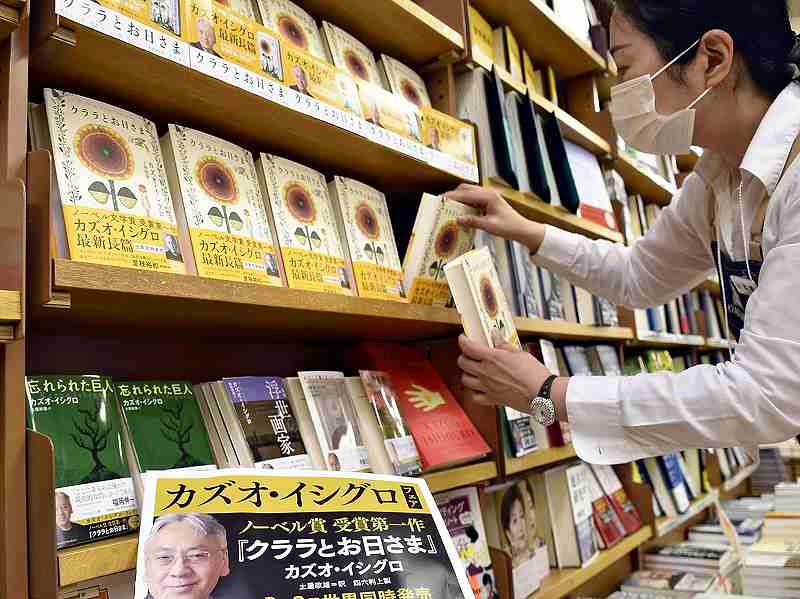
Copies of “Kurara to Ohisama,” the Japanese translation of “Klara and the Sun,” are seen at the Kinokuniya Otemachi Building store in Chiyoda Ward, Tokyo, on March 2, the day of the book’s release.
19:02 JST, March 25, 2021
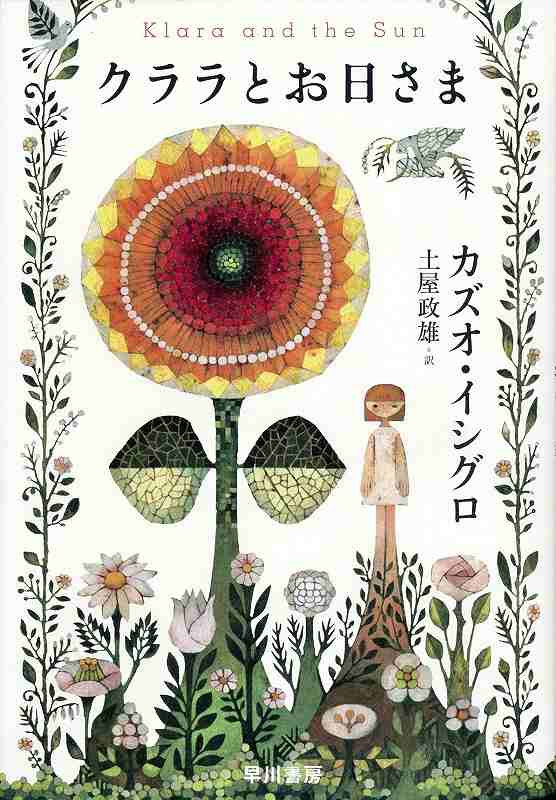
The cover of “Kurara to Ohisama”
Japanese-born British writer Kazuo Ishiguro’s latest novel “Klara and the Sun” was released on March 2. This is his first novel since he was awarded the 2017 Nobel Prize in Literature. A Japanese translation, “Kurara to Ohisama,” was published by Hayakawa Publishing Corp. on the same day.
The novel ponders the relationship between artificial intelligence and humanity. Although his new novel is about a near-future society, it evokes nostalgia, as if the reader is looking at an old, sepia-toned photo album.
In an online interview with The Yomiuri Shimbun and other Japanese media prior to its publication, Ishiguro said: “I’ve always been interested in this question: ‘What exactly is human love?’ … It’s easier to ask in a story in which you have introduced artificial intelligence.”
The novel is set in a near future in which AI-equipped humanoid robots are popular as AFs, or Artificial Friends, for children. This work also contemplates whether AI could replace humans.
“At the moment, I don’t have any big fear about robots attacking us or taking over from human beings,” he said.
“When the day comes when a novel written by an artificial intelligence machine really moves me and makes me cry, I would be very concerned,” Ishiguro said, suggesting that the milestone will be whether an AI can understand and manipulate human emotions.
Regarding the coronavirus pandemic he said, “What has happened in the pandemic, I think, is something that I feel I should pay attention to as a writer.” He also said that book sales have greatly increased in Britain amid the pandemic.
Analyzing that phenomenon, he said: “People need stories at a time of crisis. They need stories not just for escape, but we crave a narrative about what is happening to us and why it’s happening to us and where we might be going next.”
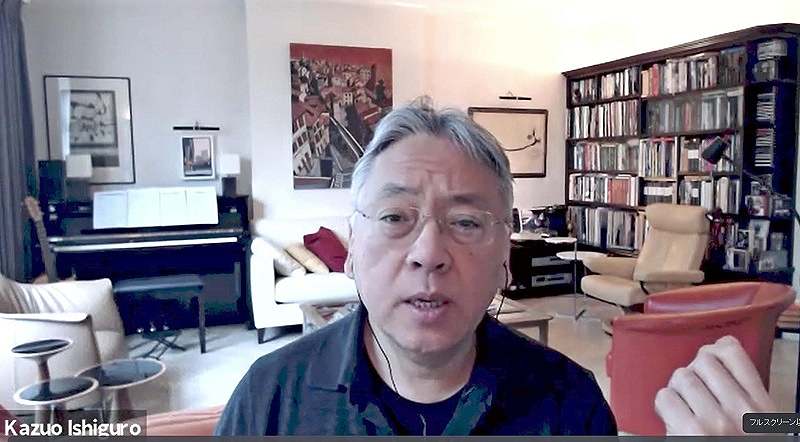
A screenshot shows Kazuo Ishiguro talking about his new novel “Klara and the Sun” in an online interview. He said that he feels the end of the story resembles some Yasujiro Ozu films.
‘Lens of loneliness’
It has been a little more than three years since he won the Nobel Prize in Literature. Ishiguro said that receiving the award was an exciting event for him but it hasn’t had a major impact on his life. He also said humorously that it was like something that happened in another universe. At that time, he had already written one-third of “Klara and the Sun.”
The first-person narrator of the story is Klara, a humanoid machine equipped with AI. Klara, built as an AF for children, becomes a companion of a frail girl named Josie. The time Klara shares with Josie is narrated in the story.
“The choice of Klara as the narrator allowed me to focus very specifically on certain aspects of human life. Because Klara is a robot that’s been created for the purpose of preventing teenagers from becoming lonely, Klara sees the human world very much through this lens of loneliness,” Ishiguro said.
This is Ishiguro’s eighth novel, including the “The Remains of the Day,” which portrays with a touch of sadness an English butler who remains loyal to old-fashioned ideas and traditions even as they disappear. “Klara and the Sun” is reminiscent of the world of his novel “Never Let Me Go,” which addresses bioethical issues through a story about a special school for young people who have been brought into existence to serve as organ donors.
“It seemed to me having a central character who was an AI robot would give me some of the same advantages — in fact, some more — that I had in ‘Never Let Me Go,’ which is that I could actually focus on human beings and the human world from a new, different perspective.”
As suggested by the Japanese edition’s brightly colored cover, “Klara and the Sun” has the atmosphere of a children’s book. Ishiguro said that Klara’s character “has a relationship to children’s books … with simple stories and big pictures” that are aimed at readers aged 4 to 6. He called such books “a big influence.”
“Klara comes into this world knowing almost nothing about the human world. She’s rather like a baby learning very fast but also drawing very strange conclusions because her information is so limited. That aspect of her logic is what was appealing to me,” Ishiguro said.
“Even a lot of the images that I created in my novel, I think I had in my mind the kind of illustrations — the pictures and the colors that you would see in those small children’s books — a field, a big sky, a bright Sun. And also some of the hope and the belief in something good like the Sun. All these things that Klara holds on to all the way through the book.”
An AI humanoid without a literal heart deeply cares for a little girl — this paradoxical situation may powerfully drive the reader to think about the nature of humans.
Ishiguro was born in 1954 in Nagasaki, which he said “has a fascinating history, quite aside from the tragic and terrible events of [the atomic bombing in] August 1945.” He moved to Britain in 1960 at the age of 5, due to his father’s job as an oceanographer. His mother, Shizuko, was an atomic-bombing survivor who died in 2019 at the age of 92. The novel is dedicated to her memory.
“[My mother] was just as determined as Arnold Schwarzenegger’s Terminator. Everything she did, everything she thought, at the back of her mind was, ‘What would be the best thing for my children?’”
He also said that his mother’s character is reflected in Josie’s mother in “Klara and the Sun.”
Ishiguro said that he has often incorporated cutting-edge science into his works, such as “Never Let Me Go” and his new novel, because of the influence of his father, who was a scientist.
Reflecting on how he grew up watching his father’s career as a scientist while hearing his mother tell of her memories of the bombing, he said: “Science can be a marvelous thing for human progress, but on the other hand, unless we control it, it can lead to the most awful things … These things have always reminded me about science — the great things it can do and the terrible things it can do.”
Science versus emotion
Ishiguro is deeply interested in world affairs, such as Britain’s exit from the European Union, the U.S. presidential election, and the novel coronavirus pandemic. In the interview, he expressed concern over modern society, saying, “It seems like there’s a conflict between an emotion-based idea of how you look for the truth and the scientific way of looking for the truth.”
Due to the pandemic, Britain has gone under repeated lockdowns since March last year. Ishiguro said that he had already finished writing “Klara and the Sun” by the end of 2019. Last year, he was busy doing work related to the novel with his editors, which kept him at home almost constantly, as if he were locking himself in.
“I think [the pandemic has] come at a very strange time. The pandemic came at a time when, all around the world, we were seeing a reaction against globalization and international cooperation,” he said, noting the emergence of nationalist movements all around the world.
“For a writer like me, the pandemic is an important event to consider,” he said, as he has been interested in “international impulses and tribal instincts” as themes of his work.
Ishiguro is particularly concerned about the spread of biased “conspiracy theories” as a negative impact of online society, which allows people to see only the information they like.
“People no longer seem to care about facts or evidence. What is important is what they believe emotionally. We had a situation that almost half of America seems to believe that Donald Trump actually won the election, even though there’s no evidence, because they just feel it emotionally in their hearts.”
Another example is the conspiracy theories about the pandemic. “There are small movements, even in Britain, of people who … have been standing outside of NHS [National Health Service] hospitals chanting abuse at exhausted doctors and nurses. Because they believe that this is a hoax, and that the pandemic doesn’t exist,” Ishiguro said.
As a writer, he has mixed feelings about the situation. “I’m becoming concerned about what I do because I have always said that the importance of fiction is that it helps us share emotions … I am producing something that says emotion is very important and emotional truth is what matters. So this leads me to actually question, very fundamentally, the importance of what I do,” Ishiguro said.
At the moment, he has yet to start writing a new work.
“When such huge things happen in the world … At times like these, I think it’s quite important for a writer like me to just put down the pen and pay as much attention as possible to what is going on in the world,” he said.
While making this remark, the writer, who created the story of the AI humanoid Klara having human qualities exceeding those of real humans and the kind-hearted girl Josie, relaxed his serious expression and returned to his usual gentle appearance.
Top Articles in Culture
-

BTS to Hold Comeback Concert in Seoul on March 21; Popular Boy Band Releases New Album to Signal Return
-

Director Naomi Kawase’s New Film Explores Heart Transplants in Japan, Production Involved Real Patients, Families
-

Tokyo Exhibition Offers Inside Look at Impressionism; 70 of 100 Works on ‘Interiors’ by Monet, Others on Loan from Paris
-
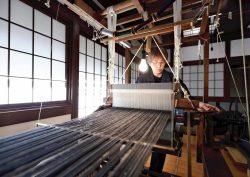
Traditional Japanese Silk Hakama Tradition Preserved by Sole Weaver in Sendai
-

Exhibition Featuring Yoshiharu Tsuge’s Manga World Underway in Chofu, Tokyo; Unique, Surreal Works Draw Steady Crowds
JN ACCESS RANKING
-

Producer Behind Pop Group XG Arrested for Cocaine Possession
-

Japan PM Takaichi’s Cabinet Resigns en Masse
-

Man Infected with Measles Reportedly Dined at Restaurant in Tokyo Station
-

Israeli Ambassador to Japan Speaks about Japan’s Role in the Reconstruction of Gaza
-

Videos Plagiarized, Reposted with False Subtitles Claiming ‘Ryukyu Belongs to China’; Anti-China False Information Also Posted in Japan




